Tweedledum and Tweedledee
Studies in Alice XVI, by Marc Edmund Jones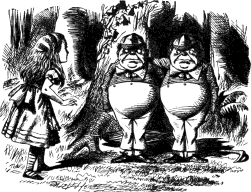 This lesson considers the fourth chapter of Through the
Looking-Glass and the sixteenth great principle of
wisdom in the Philosophy of Concepts as revealed
through the adventures of Alice is that difference is
created in attenuation and that the beginning of
under-standing is in the smallest and most trivial
details of life rather than in the larger issues. Indeed, it
is in petty things that the meanness of man is to be
realized. Many an individual who otherwise is
perfectly honest is willing to steal a streetcar ride or
help himself to a pencil. In the greater issues of life
nearly every person rises to the point of generous and tolerant co-operation with his fellows. In
times of disaster there are few individuals who do not manifest the divine indwelling to a
superlative extent. Therefore in all philosophical work and especially in the so-called higher
spiritual teachings it is necessary to realize that the acquisition of the great and enduring
principles must be at first in inchoate and hazy form.
This lesson considers the fourth chapter of Through the
Looking-Glass and the sixteenth great principle of
wisdom in the Philosophy of Concepts as revealed
through the adventures of Alice is that difference is
created in attenuation and that the beginning of
under-standing is in the smallest and most trivial
details of life rather than in the larger issues. Indeed, it
is in petty things that the meanness of man is to be
realized. Many an individual who otherwise is
perfectly honest is willing to steal a streetcar ride or
help himself to a pencil. In the greater issues of life
nearly every person rises to the point of generous and tolerant co-operation with his fellows. In
times of disaster there are few individuals who do not manifest the divine indwelling to a
superlative extent. Therefore in all philosophical work and especially in the so-called higher
spiritual teachings it is necessary to realize that the acquisition of the great and enduring
principles must be at first in inchoate and hazy form.
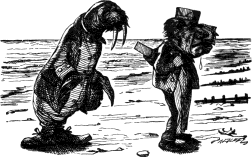 These can only be obtained by intuitive flashes or
made manifest by the extreme stimulus of unusual
outer conditions such as cataclysm or supreme
emergency until their outer condition is recognized in
some small and easily controlled sphere where
observation may be organized intelligently. The
higher principles in their operation through lower
manifestation are embracing or unifying. Their
downward trend is away from difference. It is the
superimposition of higher authority on a lower realm of manifestation that from the point of view
of that lower realm is destructive to individuality. Control from above is paternal and so wholly
instinctive in its lower operation. Difference is divine as explained in Lesson V. It is the
conscious upreaching from the manifest to the supporting unmanifest. Therefore it may be seen
that the most trivial things lead to the greatest wars and conflicts and that glamour or illusion
alone is truly harmonizing.
These can only be obtained by intuitive flashes or
made manifest by the extreme stimulus of unusual
outer conditions such as cataclysm or supreme
emergency until their outer condition is recognized in
some small and easily controlled sphere where
observation may be organized intelligently. The
higher principles in their operation through lower
manifestation are embracing or unifying. Their
downward trend is away from difference. It is the
superimposition of higher authority on a lower realm of manifestation that from the point of view
of that lower realm is destructive to individuality. Control from above is paternal and so wholly
instinctive in its lower operation. Difference is divine as explained in Lesson V. It is the
conscious upreaching from the manifest to the supporting unmanifest. Therefore it may be seen
that the most trivial things lead to the greatest wars and conflicts and that glamour or illusion
alone is truly harmonizing.
Here is the principle of the ultimate or of the root of all consciousness. The paternal wisdom that comes from above is as it were a glamorous or illusionary consciousness to all life in the lower or manifest world. Individual self-consciousness has no real part in it. The self borrows consciousness from a race in order to grow into a race or whole consciousness on its own account. That it will then be a part of a higher consciousness is of no present importance. Such reasoning goes on without end and leads to a headache. From the standpoint of higher understanding it is not literally correct. All eternal difference lies in ultimate detail. The intermediary differences between the atom of self and the embracing oversoul are transitory and merely reflective of the real difference inherent in self. The ultimate lies in the self and must be cultured in self. The symbolism of the fourth chapter of Looking Glass is therefore interesting in the delightful drawing of the two brothers Tweedledum and Tweedledee and in the delicious employment of the word contrariwise in reference to that which is in reality no different. In the story of the two little plump characters there is the perfect swallowing up of all issues in detail, and this is especially marked in the preparations for the battle. The number of strings to be tied, and the various appurtenances to be hung on to each, serve to delay the actual battle. This has to be agreed on in the first place and is promptly forgotten on the arrival of the big crow. The rattle, only useful for making a noise, is an excellent symbol for the least important case of a real conflict. It is the first toy of infant intelligence. The monstrous crow is the symbol for their desire, which is to have an excuse to avoid the fight. If the student will watch children, or adults for that matter, he will see that it is only seldom that a fight is entered into except for the unfortunate circumstances of the failure of any excuse to call if off. In the front line trenches of World War I it was necessary to change the soldiers constantly to prevent fraternizing, and the greatest problem during war on the part of any belligerent is to keep people interested. A really difficult feat is not to prevent wars but to keep them going.
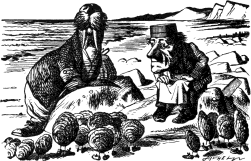 The achievement of imagination in the chapter, or the
sixteenth great scientific anticipation, is the revelation
here of the principles of a real philosophy or idealism
toward which, and away from realism, the world is
turning seriously at last. Philosophy is not generally
considered the proper partner for science, and as a
matter of fact the philosophies of the present historical
period have been almost wholly metaphysics and
therefore religious in trend and have left to science the
task of clear thinking in reference to its own problems
of the analysis and organization of principles. It is because of the lack of a real philosophy that
the world now seems on the threshold of developing, that so many thinkers instrumental in the
reorganization or modern thought are classified as scientists and that so many speculators in the
realm of thought who in contrary fashion have contributed nothing enduring to the world have
been enabled by default to be considered philosophers. There are fundamentally two schools in
philosophy. The Aristotelian dominance gave the world its realism and founded science in its
first stage. Now the scientific world, as marked by interest in extrasensory perception and
psychoanalysis, is lifting itself up into the idealism that in truth is owed to Plato and to the
thinning succession of his followers.
The achievement of imagination in the chapter, or the
sixteenth great scientific anticipation, is the revelation
here of the principles of a real philosophy or idealism
toward which, and away from realism, the world is
turning seriously at last. Philosophy is not generally
considered the proper partner for science, and as a
matter of fact the philosophies of the present historical
period have been almost wholly metaphysics and
therefore religious in trend and have left to science the
task of clear thinking in reference to its own problems
of the analysis and organization of principles. It is because of the lack of a real philosophy that
the world now seems on the threshold of developing, that so many thinkers instrumental in the
reorganization or modern thought are classified as scientists and that so many speculators in the
realm of thought who in contrary fashion have contributed nothing enduring to the world have
been enabled by default to be considered philosophers. There are fundamentally two schools in
philosophy. The Aristotelian dominance gave the world its realism and founded science in its
first stage. Now the scientific world, as marked by interest in extrasensory perception and
psychoanalysis, is lifting itself up into the idealism that in truth is owed to Plato and to the
thinning succession of his followers.
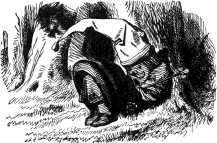 The symbolism of the red king's dream in this chapter is one
of the truly remarkable concepts in the book. It is
comparable to the pituitary mushroom, but it is not new in
the world and Carroll might as easily have adapted it as
created it, with no way to tell which. All reality is unreality
to larger reality, and therefore great minds in realism from
the beginning of the birth of human thought have seen
necessity to begin
creation with a
thinking being to create it or to sustain the creation in his
dream. Carroll's treatment has the extreme merit of the
deft lightness usual in the Alice writing. It is pointed out
to Alice that she need not fear awakening the king for the
reason that no man can wake up the dream that is
sustaining him. This is the indestructibility idea of idealism and
foundation for all larger understanding. Man cannot under any circumstances do anything that
will annihilate or snuff himself out.
The symbolism of the red king's dream in this chapter is one
of the truly remarkable concepts in the book. It is
comparable to the pituitary mushroom, but it is not new in
the world and Carroll might as easily have adapted it as
created it, with no way to tell which. All reality is unreality
to larger reality, and therefore great minds in realism from
the beginning of the birth of human thought have seen
necessity to begin
creation with a
thinking being to create it or to sustain the creation in his
dream. Carroll's treatment has the extreme merit of the
deft lightness usual in the Alice writing. It is pointed out
to Alice that she need not fear awakening the king for the
reason that no man can wake up the dream that is
sustaining him. This is the indestructibility idea of idealism and
foundation for all larger understanding. Man cannot under any circumstances do anything that
will annihilate or snuff himself out.
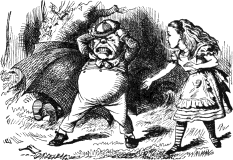 The law of applied psychology or the sixteenth big idea for the solution of personal problems is
brought out in the technique of salesmanship with the world famous Walrus and Carpenter
providing the text. Inducements are necessary in all persuasion. Ideas must be put into things
and must be illumined with meaning and purpose. As a kitten will not find an object interesting
until it is moved and as a shopper suddenly wants an item on a bargain table that another bargain
seeker reaches for, so desirability and value in all things are im-planted rather than inherent.
The sand that stirs the walrus is the symbol for the unused but worked on material of life. In the
crocodile tears of the walrus is seen life's compulsion since man has to express himself even if he
feels called on to shed the polite tear as an alibi.
The law of applied psychology or the sixteenth big idea for the solution of personal problems is
brought out in the technique of salesmanship with the world famous Walrus and Carpenter
providing the text. Inducements are necessary in all persuasion. Ideas must be put into things
and must be illumined with meaning and purpose. As a kitten will not find an object interesting
until it is moved and as a shopper suddenly wants an item on a bargain table that another bargain
seeker reaches for, so desirability and value in all things are im-planted rather than inherent.
The sand that stirs the walrus is the symbol for the unused but worked on material of life. In the
crocodile tears of the walrus is seen life's compulsion since man has to express himself even if he
feels called on to shed the polite tear as an alibi.
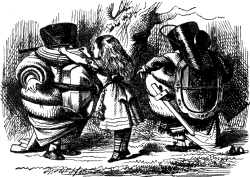 The student must learn to USE A BRUSH and to paint
everything in life with colors of self. He must learn
the constructive value of glamour from the modern
science of retail merchandising and outwardly lay it on
as the first stage in all expression.
The student must learn to USE A BRUSH and to paint
everything in life with colors of self. He must learn
the constructive value of glamour from the modern
science of retail merchandising and outwardly lay it on
as the first stage in all expression.

Sabian.org





